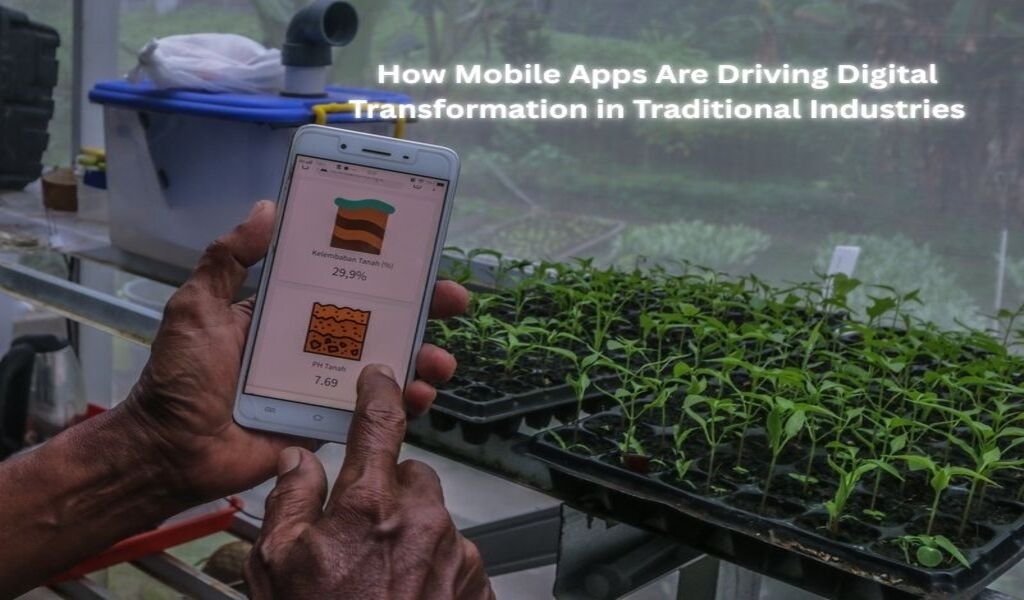AI DevelopmentHow Mobile Apps Are Driving Digital Transformation in Traditional Industries

Table of Contents
Introduction
Let’s face it — traditional industries have long depended on paper-based processes, legacy systems, and disconnected operations. But those days are quickly fading. Today, even the most conventional sectors are embracing mobile apps to streamline processes, improve productivity, and cut down on delays and inefficiencies.
Mobile apps aren’t just changing how businesses operate — they’re transforming entire industries from the ground up.
In this guide, we explore how mobile apps are enabling this shift, real-world use cases, the technologies behind it, and what you should know before building one.
Why Mobile Apps Are Core to Digital Transformation
Mobile apps are often the first step towards true digital transformation — and for good reason.
They’re intuitive, cost-effective, and highly adaptable. Whether you’re operating a multi-location warehouse or running a rural health outreach, apps help bring digital processes directly to the field.
Here’s why mobile apps are essential:
Nearly every employee now has a smartphone
Apps collect real-time data instantly from the field
Offline functionality ensures operations don’t stop in low-signal zones
UX can be customized for every user role — from delivery staff to plant managers
They replace time-consuming processes like physical logbooks, delayed emails, or spreadsheet chaos
Apps make it possible to access and act on business data in the moment — not hours or days later.
Which Industries Are Embracing Mobile?
From farming to construction, here’s how mobile apps are reshaping traditional sectors:
| Industry | How Apps Are Used |
|---|---|
| Manufacturing | Equipment inspections, worker training, part tracking |
| Healthcare | Teleconsultations, patient tracking, medicine reminders |
| Retail | POS syncing, order updates, loyalty programs |
| Logistics | Live fleet tracking, ePOD (electronic proof of delivery) |
| Agriculture | Crop monitoring, pest alerts, farmer advisory |
| Construction | Site check-ins, project tracking, daily logbooks |
Many of these fast-evolving sectors are turning to Mobile App Development Companies in Chennai to build rugged, reliable, and highly tailored solutions. These companies understand the unique challenges of working in low-connectivity environments, handling multilingual user bases, and ensuring the apps are intuitive for non-technical users. Whether it’s a construction site logbook that works offline, a fleet management tool with real-time sync, or a farmer advisory app in regional languages — Chennai-based teams deliver mobile apps that fit the industry, not just the device. With experience across sectors like manufacturing, retail, logistics, and agriculture, they know how to turn complex processes into clean, user-friendly mobile experiences that drive real outcomes.
Key Business Functions Transformed by Mobile Apps
1. Field Operations
Gone are the days of handwritten field reports. With a mobile app, field engineers, site inspectors, or sales agents can upload data, images, and reports directly from their smartphones.
2. Real-Time Communication
Whether it’s alerting a team about a route change or notifying a plant manager of a downtime event — mobile push notifications and chat functions allow everyone to stay aligned.
3. Compliance & Audit Logging
Apps help replace paper logbooks with timestamped entries, geo-tagged inspections, and automated reminders — improving audit-readiness.
4. Reporting & Dashboards
Instead of chasing reports, decision-makers get real-time dashboards. Apps feed data directly into BI tools, offering visibility across locations.
5. Safety & Training
Mobile e-learning modules, checklists, or incident reporting tools help improve safety practices — especially in manufacturing or construction sectors.
Real-World Use Cases by Industry
Manufacturing
QR-based equipment tracking
Machine downtime logging
Safety checklists in app format
Healthcare
Patient registration and vitals logging
Appointment and medication tracking
Doctor scheduling apps
Logistics
Route tracking and live traffic alerts
Delivery confirmation via timestamped photo
Fleet diagnostics and driver compliance monitoring
Retail
Barcode-based stock checkers
Location-based promotions
Loyalty wallet apps for customers
Construction
Mobile punch-in systems for laborers
Blueprint viewing in offline mode
Site photo reports for project status
Apps tailored to real field workflows often outperform generic software solutions by a mile.
Technology Stack & System Integration
The most successful apps are those that integrate seamlessly with the tools your team already uses:
Recommended Stack:
Frontend: Flutter, Kotlin, Swift, React Native
Backend: Node.js, .NET Core, Python (FastAPI)
Database: Firebase, PostgreSQL, MySQL, MongoDB
Integrations: REST APIs, SAP connectors, Tally bridge, OCR
Offline Sync: SQLite, Hive, Redux Persist
Cloud: AWS, GCP, Azure
A AI Software Development Company in Chennai can take your tech stack further by embedding intelligent features directly into your app ecosystem. Whether it’s adding predictive maintenance for manufacturing, auto-classifying documents in HR, or scanning invoices with OCR, these teams know how to seamlessly integrate AI into your existing systems. They ensure that your app doesn’t just “talk” to your ERP, CRM, or accounting software — it learns from the data and gets smarter over time. With a deep understanding of both mobile and AI tech stacks, Chennai-based firms can bridge backend intelligence with frontend usability. The result? Scalable, responsive apps that not only work across platforms and devices but also actively support smarter decision-making in real time.
Case Study: Mobile App for Equipment Inspections
Client: Confidential (NDA in place)
Industry: Pan-India Industrial SupplierChallenge: Their field inspections were done on paper, often reaching the HQ 3–4 days late. Maintenance alerts were missed, and paperwork got lost.
Solution: Our team built a mobile app using Flutter, which included:
QR-based equipment lookup
Inspection checklists with photo upload
Offline capability with cloud sync
Language toggle (English, Hindi, Tamil)
Admin dashboard with regional filters
Results:
90% faster reporting
Zero lost inspection reports
Actionable alerts sent in real-time to maintenance teams
Delivered in 7 weeks by our Chennai-based mobile team.
How to Choose the Right Mobile App Development Partner
It’s easy to find developers. But building something that works in real-world conditions? That takes experience.
| What to Look For | Why It Matters |
| Experience in your industry | They understand actual workflows and edge cases |
| Offline-first capability | Essential for rural, field, or factory environments |
| Backend + dashboard support | Enables admin-level visibility and decision-making |
| Strong UI/UX skills | Adoption improves with easier user flows |
| Support post-deployment | Bugs, training, and updates must be covered |
Choose a mobile app development company in Chennai that brings both technical and domain knowledge to the table.
Costs, Timelines & ROI Expectations
| Deliverable | Timeline | Estimated Cost (INR) |
| Basic MVP (1–2 workflows) | 3–5 weeks | ₹4–6 lakhs |
| Full-featured app + admin | 8–12 weeks | ₹8–15 lakhs |
| AI-enhanced multi-role app | 12–16 weeks | ₹15–30 lakhs |
ROI Snapshot:
Save 50–70% time in reporting workflows
Reduce manual errors by 80%
Get faster insights, leading to better business decisions
Most clients recoup their investment in 4–6 months.
The Future: Mobile + AI = Smart Automation
The next wave of apps won’t just collect data — they’ll make sense of it.
Future-ready features include:
Predictive alerts (e.g., part failure or absenteeism)
Auto-tagging from image uploads
Voice-to-text reports for workers
Document scanners using OCR
With support from an AI Development Company in Chennai, you don’t have to build everything at once — these intelligent features can be rolled out in phases, aligned with your team’s workflows and readiness. Whether you’re starting with OCR for scanning documents or planning for predictive alerts down the line, the right partner will help you prioritize, integrate, and scale. These companies bring not just technical skills, but also a strategic understanding of how AI and mobile apps can work together to automate tasks, reduce human error, and speed up operations. As your users interact with the app, your AI system continues to learn and refine itself — turning routine processes into smart, self-improving systems. It’s not just about building an app anymore; it’s about building intelligence into every tap.
Final Thoughts + CTA
Mobile apps aren’t just about going digital — they’re about doing more with what you already have.
With the right partner, traditional businesses can:
Modernize outdated processes
Connect field teams with HQ
Replace paperwork with insights
Improve accountability and speed
Curious what a mobile-first workflow could look like for your industry? Let’s schedule a call and explore what’s possible.
FAQs
1. Can we integrate the app with Tally or SAP?
Yes. We use APIs or middleware to ensure smooth syncing.
2. What if users don’t have internet all the time?
Apps are built offline-first with smart sync engines.
3. Is training provided for end users?
Yes. We offer quick-start guides and on-site or remote training.
4. What’s the typical maintenance after launch?
Bug fixes, feature additions, admin support, and update cycles.
5. Can the app be multilingual?
Absolutely. Most of our enterprise apps support regional languages.




